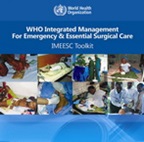Trauma and Emergency Surgery Kit (TESK) 2019
For 50 patients requiring surgical care in emergency situations assuming 2 operations per patient (100 interventions)
WHO trauma and emergency surgery kit (TESK) aims to provide materials and drugs to meet the needs of 50 patients requiring surgical care in emergency situations, assuming an average of two operations per patient. This kit is intended for use by health care providers who are trained in appropriate management of emergent surgical issues and are acting within their scope of practise. It is designed for use in areas where basic levels of infrastructure exist. The composition of TESK has recently been revised in collaboration with the International Committee of the Red Cross to meet the dynamic requirements of emergency situations. In general, this kit contains oral and IV medicines including cold chain drugs and medical supplies including renewables and instruments.
WHO TESK is intended to provide the resources needed for surgical procedures in operating theatres. Some of the sub-units may be used for simpler procedures that may occur in other parts of the facility.
A complementary kit intended for the care of acutely ill and injured patients in hospital emergency units, field hospitals or clinics providing acute care, is under development and targeted for release in 2020.
Composition of the TESK 2019

The MODULE 1 composed of 3 modules 1A, 1B and 1C.Module 1A comprises 7 sets consisting of medicines, while module 1B consists of 11 sets, and module 1C consists of 4 sets, all of which are comprised of renewable medical devices. Requests are processed at the set level; it is not feasible to order an entire module.
The MODULE 2 composed of 3 modules 2A, 2B and 2C. These modules exclusively consist of surgical instruments categorized by procedures. Module 2A includes 9 sets of surgical instruments for general surgery, Module 2B contains 6 sets for orthopaedic surgery, and Module 2C comprises 7 sets for specialized surgery.
Please be aware that module 2 underwent revisions in February 2024, including updates to set compositions, addition of new sets, and discontinuation of some existing ones. For further details, please refer to the complete content.
Related links
Publications

WHO-ICRC Basic Emergency Care: approach to the acutely...

Guidelines for essential trauma care
The Guidelines for essential trauma care seek to set achievable standards for trauma treatment services which could realistically be made...

The WHO Integrated Management for Emergency & Essential Surgical Care e-learning toolkit (CD) has been developed by the Clinical Procedures Unit in...

Confronted with worldwide evidence of substantial public health harm due to inadequate patient safety, the World Health Assembly (WHA) in 2002 adopted...

